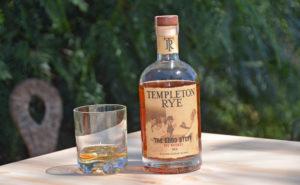By Richard Thomas
Templeton Rye joined the ranks of bottlers-turned-distillers last week when their $35 million distillery went operational. Starting August 7, new oak barrels have been filled and transferred to their on-site warehouse, capable of storing 54,000 barrels of whiskey. As the basic Templeton Rye is listed as a four year old, the transition from sourced whiskey, distilled and aged at MGP in Indiana, to in-house whiskey will begin in 2022.
The opening of the distillery marks the final chapter in the brand’s dubious story as the symbol for deceptive whiskey labeling. Templeton Rye got its start in 2006, before the ongoing Bourbon Boom or the mixology-driven Rye Craze began. The brand was inspired by a Prohibition era moonshine, made from rye and sugar, and the brand created in part by descendants of those moonshiners and bootleggers. Although the company would frankly admit their whiskey was sourced from the distillery now known as MGP in Indiana to journalists, their marketing indicated it came from Iowa. Thus, they ran afoul of bloggers and bourbon forum followers, and soon became the symbol for everything that was wrong with the whiskey industry at the time.
This remained something of an underground issue until 2014, when the mainstream press took the story and ran with it. Templeton Rye soon found itself embroiled in consumer lawsuits, and subsequently came clean about their production in style: they not only made a mea culpa about their sourcing, but admitted to adding a minute amount of flavoring to their whiskey as well. The latter was not even suspected at the time or even at issue.
It has been four years since Templeton Rye confessed, and deceptive whiskey marketing has become passe as an issue. Despite this, some bloggers continue to harp on the company, seizing upon even the slightest bit of flowery language in a press release as an excuse to (sometimes inaccurately) relive the past.
I take a different view, believing the point of calling out a company for bad practices is to inform the public and to prompt said company to change their practices. Implicit in those objectives is the understanding that if a company mends its ways, this should be acknowledged. While one may revisit the subject as history (as I have done in this article), but the muckraking ought to stop. Fair is fair.
Templeton Rye made their confession four years ago, and that confession should have been good enough for anyone interested in doing anything beyond mere croaking. Now they have fulfilled a de facto promise made some 12 years ago and opened a medium-sized distillery. The past is very much in the past. The only “Templeton Lie” circulating now is the one told by a few cranks who don’t stubbornly refuse to acknowledge it.
 The Whiskey Reviewer A World of Whiskey, Poured Every Weekday
The Whiskey Reviewer A World of Whiskey, Poured Every Weekday

